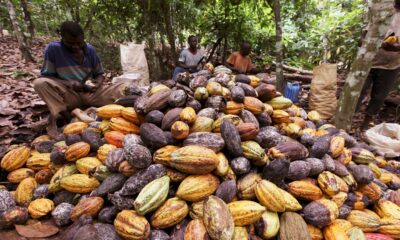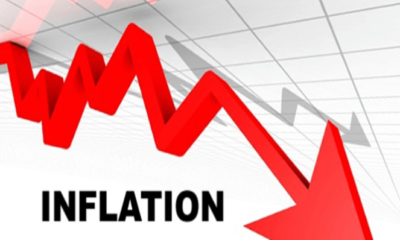Strictly Personal
The electorate and governance in the Ghanaian political system, By Michael Akeno
Published
1 year agoon

Abraham Lincoln, a one-time great President of America, made the following landmark statement: “Government of The People, By The People, For The People”
This is the popular definition of democracy, championed and propagated by America all over the world, to countries that practice this system of governance at the present time.
Ghana, a developing country in the modern world today, practises this system of governance at the present time.
In order to ensure an effective and efficient practice of democracy in the Ghanaian situation to be on the same level as prevails in other countries and America, the greatest and most powerful nation on earth today, there is the need for a thorough and elaborate education for the Ghanaian electorate as to what entails in the practice of this democratic system of governance.
This is so and very necessary because there had been deep ignorance among some of the Ghanaian electorate pertaining to a democratic system of governance.
Since Ghana embarked on the democratic system of governance, it can be observed that the majority of the electorate in Ghana does display ignorance in the choosing of leaders and other political office holders of the government of the country.
There are a number of negative factors for this unfortunate situation that this article seeks to identify and address as a way of minimising this situation, if not eradicating it completely from the body system of Ghanaian politics.
The first factor that one can identify is that of low education and illiteracy. The second is ethnicism and sectionalism. The third is selfishness and avarice. The fourth is over-ambition. The fifth is corruption.
I shall attempt in the following to offer some suggestions for the minimising and eradication of this persistent and problematic situation in the body politics of Ghana.
Although the ratio of literacy and illiteracy rate in Ghana is higher as compared to other African countries, there is an urgent need to step up the literacy rate in Ghana so that a great number of Ghanaians will be able to read and write.
This will facilitate easy communication, interaction, and understanding among Ghanaians; and this in turn will bring about a good understanding of national issues and aspirations of the developmental process of the country.
To this end, there is the need therefore for successive governments to pay priority attention to the formal education of every school going age Ghanaian child; and also to organise a country-wide, mass illiteracy education campaign programmes with the aim of eradicating illiteracy in the country among Ghanaians who cannot read and write.
Ethnicism and sectionalism constitute a major obstacle in Ghanaian politics; and efforts must be made by all Ghanaians, both high and low stature to eliminate this unpleasant situation in the country.
Ghanaians must therefore learn to live in unity, peace, and tolerance; seeing each other as brother and sister with one common destiny in the developmental process of the country. Ghana belongs to all Ghanaians irrespective of where one comes from. And with this mentality and consciousness, Ghanaians can move together as one people with a common destiny.
Avarice and selfishness must be shunned and uprooted among Ghanaians to enable Ghanaians to show much love to each other. This will enhance the speedy development of the country.
The inordinate desire to get access to political rule and authority to amass wealth, no matter what is involved must be eschewed by all Ghanaians. This will ensure peace, unity, and justice in Ghanaian society so that Ghana will move healthily to experience speedy economic growth, development, and prosperity.
Self-centeredness and over-ambition had been the bane and setback of any realistic and meaningful development to many a nation in Africa, and Ghana should not fall a victim to these militating and negative factors for political control and rule.
Corruption and immoralities had contributed to the fall of great nations in the past and in modern times.
All forms of corruptible practices must be uprooted from Ghanaian society so that virtues and moralities will prevail.
When Ghanaians are guided by morality and upright living styles, the country will speedily experience optimum economic growth, development, and prosperity.
Ghanaians must therefore learn to become disciplined in their lifestyles, so that they can work together in faith and honesty with each other to bring about a speedy development of the country.
In the matter of choosing candidates for the various political offices and leaders of the country, the electorate by virtue of good education, clear mentality, and consciousness must endeavour at all times to choose the right and honest people to occupy political offices.
The electorate must not choose people for political offices by virtue of where these people come from in the country; but strictly by their capabilities and abilities to deliver to the best interests of the country.
This is what prevails in the most advanced and most progressive nations of the world such as America, Britain, France, Germany, Italy, India, Japan, etc. The electorates are highly educated and well-informed, and they exercise their franchise by carefully choosing the right and capable candidates to occupy the various political offices of governance to ensure the progress and advancement of their countries. To this end, the electorates of these countries choose their candidates for governor, not on the basis of ethnicism, sectionalism, or political organization; but strictly on desirable qualities and the needs and interests of their countries.
In fact, this simplistic, naïve, and ill-informed way of voting practice is popular in African countries including Ghana, of course, the star of Africa!
This is most unfortunate and unacceptable for the smooth and healthy developmental process of African countries in their continual efforts to experience economic growth, development, and prosperity.
It is uncivilised, barbaric, and retrogressive as it is the root cause of conflicts and dissatisfaction, which often plunge African countries into civil wars and genocides that had besieged African countries in contemporary times.
When this occurs, it impedes stability, progress, and development; and introduces chaos in African countries.
Ghana is the star of African liberation and aspirations; and so she must strive hard to reverse and change this unpleasant situation in order to bring about sanity, justice, and a healthy developmental process in the life of African countries for the benefit of posterity.
Compared to other African countries situations, Ghana appears to have a long, somewhat peaceful, and sustaining democratic system of governance.
This is commendable and must be further sustained for Ghana to experience healthy economic growth, development, and prosperity, which will become a shining example for the rest of African countries to follow.
The Ghanaian experience up to date needs to be improved upon as it is fraught with the anomalies and shortcomings that had been highlighted in this article.
The Ghanaian experience has therefore not reached the stage of perfection. To this end, it is highly imperative for the Ghanaian electorate to become more enlightened and well-informed in the choice of political leaders and representation so that Ghana can become more peaceful and strongly united to experience economic growth, development, and prosperity.
Ghanaian political leaders must also try to become more sincere and honest in the devising of their political manifestos for the development and prosperity of the country.
They must also try to refrain in their campaigns for political power and leadership, the fanning of sentiments, of ethnicism, and divisiveness in their utterances; as this will generate and reinforce the conditions for divisiveness and sectionalism in the rule of the country; which are at variance in the smooth and healthy development of the country.
Ghana must rise above all the unhealthy conditions that had been mentioned in this article in order to pave a healthy and enlightened way of co-existence of the rulers and the ruled of the country to promote economic growth, development, and prosperity.
In conclusion, I reiterate that the electorate and governance conditions must undergo a rigorous transformation and change by the suggestions that had been advanced in this article for a new good chapter to be opened in the democratic system of governance of the country which at the moment appear to be shaky and vulnerable from a critical point of view.
A healthy and well-informed democratic system of governance must prevail in the present Ghanaian political situation for the rest of African countries to follow.
This is a big challenge and test to Ghanaian democracy practice.
A citizen casting his vote with the help of an electoral official
BY MICHAEL AKENOO: THEATRE CRITIC
You may like
-


Bean disease affects 81% of major cocoa region in Ghana
-


Ghana: Inflation decreases to 22.8%
-


Mohammed Kudus promotes Ghanaian jollof during West Ham pre-season training
-


Ghana’s Energy Minister Prempeh selected as Bawumia’s presidential running mate
-


University of Ghana hosts exhibition on slavery at Elmina Castle
-


Ghanaian star Kudus in new ad for footwear makers Skechers along with Kane, Zinchenko, Elanga (Video)
Strictly Personal
All eyes in Africa are on Kenya’s bid for a reset, By Joachim Buwembo
Published
5 days agoon
July 21, 2024
Whoever impregnated Angela Rayner and caused her to drop out of school at the tender age of 16 with no qualifications might be disappointed that we aren’t asking who her baba mtoto (child’s father) is; whether he became a president, king or a vagabond somewhere, since the girl ‘whose leg he broke’ is now UK’s second most powerful person, 28 years since he ‘stole her goat’.
Angela’s rise to such heights after the adversity should be a lesson to countries which, six decades after independence, still have millions of citizens wallowing in poverty and denied basic human dignity, while the elite shamelessly flaunt obscene luxury on their hungry, twisted faces.
After independence, African countries also suffered their adolescent setbacks in the form of military coups. Uganda’s military rule lasted eight years, Kenya’s about eight hours on August 1, 1982, while Tanzania’s didn’t materialise and its first defence chief became an ambassador somewhere.
What we learn from Angela Rayner is that when you’re derailed, it doesn’t matter who derailed you, because nobody wants to know. What matters is that you pick yourself up, not just to march on, but to stand up and shine.To incessantly blame our colonial and slave-trading ‘derailers’ while we treat our fellow citizens worse than the colonialists did only invites the world to laugh. Have you ever read of a colonial officer demanding a bribe from a local before providing the service due?
African countries today need to press ‘reset’. A state operates by written policies, plans, strategies and prescribed penalties with gazetted prisons for those who break the rules. This is far more power than teenage Angela had, so a reset state should take less time to become prosperous than the 28 years it took her to get to the top after derailing.
So it’s realistic for countries to operate on five-year planning and electoral cycles, so a state that fails to implement a programme in five years has something wrong with it. It needs a reset.
A basic reset course for African leaders and economists should include:
1. Mindset change: Albert Einstein teaches us that no problem can be solved from the same level of consciousness that created it. For example, if you are in debt, seeking or accepting more debt is using the same level of thinking that put you there. If you don’t like Einstein’s genius, you can even try an animal in the bush that falls into a hole and stops digging. Our economists are certainly better than a beast in the bush.
2. Stealing is wrong: African leaders and civil servants need to revisit their catechism or madarasa – stealing public resources is as immoral as rape.
3. Justifying wrong doesn’t make it right: Using legalese and putting sinful benefits in the budget is immoral and can incite the deprived to destroy everything.
4. Take inventory of your resources and plan to use them: If Kenya, for example, has a railway line running from Mombasa to Nairobi, is it prudent to borrow $3.6 billion to build a highway parallel to it before paying off and electrifying the railway?
If Uganda is groaning under a $2 billion annual petrol import bill, does it make sense to beg Kenya for access to import more fuel, when Kampala is already manufacturing and marketing electric buses, while failing to use hundreds of megawatts it generates, yet the country has to pay for the unused power?
If Tanzania… okay, TZ has entered the 21st Century with its electric trains soon to be operating between Dar es Salaam and Morogoro. Ethiopia, too, has connected Addis Ababa to the port of Djibouti with a 753-kilometre electric railway, and moves hundreds of thousands of passengers in Addis every day by electric train.
5. Protect the environment: We don’t own it, we borrowed it from our parents to preserve it for our children. Who doesn’t know that the future of the planet is at stake?
6. Do monitoring and evaluation: Otherwise you may keep doing the same thing that does not work and hope for better results, as a sage defined lunacy.
7. Don’t blame the victims of your incompetence: This is basic fairness.
We could go on, but how boring! Who doesn’t know these mundane points? We are not holding our breath for Angela’s performance, because if she fails, she will be easily replaced. Africa’s eyes should now be on Kenya to see how they manage an abrupt change without the mass bloodshed that often accompanies revolutions.
Strictly Personal
The post-budget crisis in Kenya might be good for Africa, after all, By Joachim Buwembo
Published
2 weeks agoon
July 10, 2024
The surging crisis that is being witnessed in Kenya could end up being a good thing for Africa if the regional leaders could step back and examine the situation clinically with cool-headed interest. Maybe there is a hand of God in the whole affair. For, how do explain the flare not having started in harder-pressed countries such as Zambia, Mozambique and Ghana?
As fate would have it, it happened in East Africa, the region that is supposed to provide the next leadership of the African Union Commission, in a process that is about to start. And, what is the most serious crisis looming on Africa’s horizon? It is Debt of course.
Even the UN has warned the entire world that Africa’s debt situation is now a crisis. As at now, three or four countries are not facing debt trouble — and that is only for now.
There is one country, though, that is virtually debt-free, having just been freed from debt due to circumstances: Somalia. And it is the newest member of the East African Community. Somalia has recently had virtually all its foreign debt written off in recognition of the challenges it has been facing in nearly four decades.
Why is this important? Because debt is the choicest weapon of neocolonialists. There is no sweeter way to steal wealth than to have its owners deliver it to you, begging you, on all fours, to take it away from them, as you quietly thank the devil, who has impaired their judgement to think that you are their saviour.
So?
So, the economic integration Africa has embarked on will, over the next five or so years, go through are a make-or-break stage, and it must be led by a member that is debt-free. For, there is no surer weapon to subjugate and control a society than through debt.
A government or a country’s political leadership can talk tough and big until their creditor whispers something then the lion suddenly becomes a sheep. Positions agreed on earlier with comrades are sheepishly abandoned. Scheduled official trips get inexplicably cancelled.
Debt is that bad. In African capitals, presidents have received calls from Washington, Paris or London to cancel trips and they did, so because of debt vulnerability.
In our villages, men have lost wives to guys they hate most because of debt. At the state level, governments have lost command over their own institutions because of debt. The management of Africa’s economic transition, as may be agreed upon jointly by the continental leaders, needs to be implemented by a member without crippling foreign debt so they do not get instructions from elsewhere.
The other related threat to African states is armed conflict, often internal and not interstate. Somalia has been going through this for decades and it is to the credit of African intervention that statehood was restored to the country.
This is the biggest prize Africa has won since it defeated colonialism in (mostly) the 1960s decade. The product is the new Somalia and, to restore all other countries’ hope, the newly restored state should play a lead role in spreading stability and confidence across Africa.
One day, South Sudan, too, should qualify to play a lead role on the continent.
What has been happening in Kenya can happen in any other African country. And it can be worse. We have seen once promising countries with strong economies and armies, such as Libya, being ravaged into near-Stone Age in a very short time. Angry, youthful energy can be destructive, and opportunistic neocolonialists can make it inadvertently facilitate their intentions.
Containing prolonged or repetitive civil uprisings can be economically draining, both directly in deploying security forces and also by paralysing economic activity.
African countries also need to become one another’s economic insurance. By jointly managing trade routes with their transport infrastructure, energy sources and electricity distribution grids, and generally pursuing coordinated industrialisation strategies in observance of regional and national comparative advantages, they will sooner than later reduce insecurity, even as the borders remain porous.
EDITOR’S PICK


Trevor Noah set for ‘Off the Record’ world tour
South African comedian and talk show host, Trevor Noah, has announced a date for his “Off The Record” global tour...


SA mobility startup LULA acquires UK-based Zeelo’s operations
South Africa’s mobility startup, LULA, has announced the acquisition of the operations of UK-based Zeelo in a move that will...


Ngannou accuses Joshua of employing dirty tactics in their fight in Saudi Arabia
Former UFC heavyweight champion, Francis Ngannou, has accused British-Nigerian boxer, Anthony Joshua, and his promotion team of employing unfair and...


#EndBadGovernance Protests: Please be patient with Tinubu’s govt, monarchs beg Nigerian youths
Some prominent traditional rulers in Nigeria have pleaded with Nigerian youths and organizers of the planned nationwide #EndBadGovernance protests scheduled...


UNESCO removes Senegal’s Niokolo-Koba National Park from list of World Heritage sites in danger
The United Nations’ Educational, Scientific and Cultural Organization (UNESCO) has removed Senegal’s Niokolo-Koba National Park from the list of World...


At Project Aliyense discourse, panelists call for balance between free speech, ethical considerations
The government has been urged to balance freedom of speech with ethical considerations and laws that prevent harm to others....


Adenia Partners acquires Air Liquide’s operations in 12 African countries
Adenia Partners, a leading private equity firm, has completed the acquisition of Air Liquide’s operations in 12 African countries, adopting...


We will handle planned nationwide protests as family matter— Nigerian Govt
The Nigerian government says it will handle the planned #EndBadGovernance protests scheduled to commence on August 1 as a family...


Veteran Nigerian entertainer Charly Boy vows to divorce wife if Kamala Harris doesn’t win US presidential election
Veteran Nigerian entertainer, Charles Oputa, popularly known as Charly Boy, has vowed to divorce his wife of 47 years if...


Saudi club Al Hilal places African transfer record bid for Osimhen
Saudi Arabia club side, Al-Hilal, have reportedly made an African transfer record bid for Super Eagles and Napoli striker, Victor...
Trending
-

 Sports1 day ago
Sports1 day agoMeet Nigerian-born players doing big things for Japan at Paris 2024 Olympics
-

 Metro1 day ago
Metro1 day agoWe will handle planned nationwide protests as family matter— Nigerian Govt
-

 Metro15 hours ago
Metro15 hours ago#EndBadGovernance Protests: Please be patient with Tinubu’s govt, monarchs beg Nigerian youths
-

 Tech1 day ago
Tech1 day agoAdenia Partners acquires Air Liquide’s operations in 12 African countries


